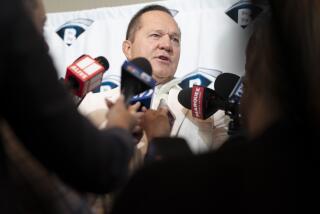Players Call for Aug. 12 Walkout Date : Baseball: With season in jeopardy, players have $175-million strike fund, and owners face loss of $140 million in postseason revenue.
- Share via
The Major League Players Assn., in a conference call among union leaders and the 28 player representatives Thursday, set a strike deadline of Aug. 12, meaning the 1994 baseball season could end in 15 days.
If there is no agreement in the collective bargaining negotiations that have polarized the two sides, there will be no games played after Aug. 11.
A long-term work stoppage could also erase the postseason, during which the owners have $140 million in TV revenue at stake.
“We believe that the Aug. 12 date maximizes the chance of successfully negotiating an agreement without a work stoppage,” said Don Fehr, the union’s executive director. “The purpose of setting the strike date earlier rather than later (in the season) is to attempt to focus and accelerate the negotiations now to see if we can get the job done.
“A strike is a last resort. No one wants to play more than the players do, but the owners continue to insist on a salary cap that would place artificial restrictions on the free market, transfer millions of dollars from players to owners, destroy free agency, eliminate arbitration and damage competitive balance.
“Moreover, the owners have made it clear that they are prepared to unilaterally implement a salary cap without the players’ consent after the season ends, which leaves us with no choice. (Owners’ negotiator) Dick Ravitch has said that strikes only occur when one side underestimates the leverage of the other. Sometimes they occur because somebody wants them to occur.”
A strike would be baseball’s eighth work stoppage since 1972. It would not prevent the owners from declaring an impasse and unilaterally implementing their salary-cap system, but it would deal a blow to their wallets, threatening the final seven weeks of a season that finds at least half of the 28 teams still involved in the new division races, not to mention the revenue from the postseason.
It would also be costly for the players, however. They would lose three paychecks and a portion of a fourth if an Aug. 12 stoppage wiped out the season. The union, for the last four years, has been retaining a portion of each player’s licensing check--which averages between $70,000 and $80,000 annually--while accumulating a strike fund of about $175 million, or about $150,000 for every player with four’ years experience. Union officials refused to reveal how that money--there would be less, of course, for players with less experience--would be disbursed in the event of a strike.
“I don’t see how either side could hold out more than 30 days,” said an attorney involved in the negotiations.
Interim baseball Commissioner Bud Selig said he wasn’t sure how many days would have to be lost before it became impossible to play the postseason, but the union, in an attempt to put more pressure on the owners, has instructed players not to work out collectively during a strike.
Selig acknowledged that the sides are far apart but that the setting of a strike date merely “raises the anxiety level of the fans.”
Ravitch said: “I regret that the union has such disregard for the fans. As I’ve said repeatedly, the only way to resolve bargaining differences is at the table, and that doesn’t change, strike or otherwise.”
He said he shares Fehr’s hope that the talks will now accelerate, but “we still await the union’s response to the problems of the game. If the players are determined to test the will of the owners, they’ll find out soon enough that the owners are not going to settle for anything less than a system that will allow them to fix costs. History would indicate (that the owners) have given in in the past, but in my judgment it won’t happen this time.”
Perhaps, but many in baseball believe Ravitch’s most difficult task will be holding the big and small markets together. Meanwhile, in an interesting break from his normal posture, Ravitch suggested that a new system does not have to be based on a salary cap, but he refused to elaborate and said there has been no cooperation from the union in formulating a new approach and no indication that it recognizes the economic problems.
This, of course, is at the heart of the debate. The union does not accept Ravitch’s contention that 19 teams will lose money this year. Nor does the union believe that an industry with revenue of $1.8 billion and projected attendance again of more than 70 million is having financial problems.
“We accept that revenue streams change and different clubs may have different problems from year to year,” Fehr said.
“Nevertheless, if the owners feel the need to change their revenue-sharing formulas, we’ll be happy to work with them on that, but don’t ask the players to pay for it with a salary cap. We’ll fight that for as long as it takes.”
Chapter 8?
A look at the previous work stoppages in baseball:
Year Type Length Games Lost Issue 1972 Strike 14 days 86 Pensions 1973 Lockout 12 days 0 Arbitration 1976 Lockout 17 days 0 Free agency 1980 Strike 8 days 0 Free-agent compensation 1981 Strike 50 days 712 Free-agent compensation 1985 Strike 2 days 0 Salary cap, Arbitration 1990 Lockout 32 days 0 Salary cap, Arbitration
More to Read
Are you a true-blue fan?
Get our Dodgers Dugout newsletter for insights, news and much more.
You may occasionally receive promotional content from the Los Angeles Times.







